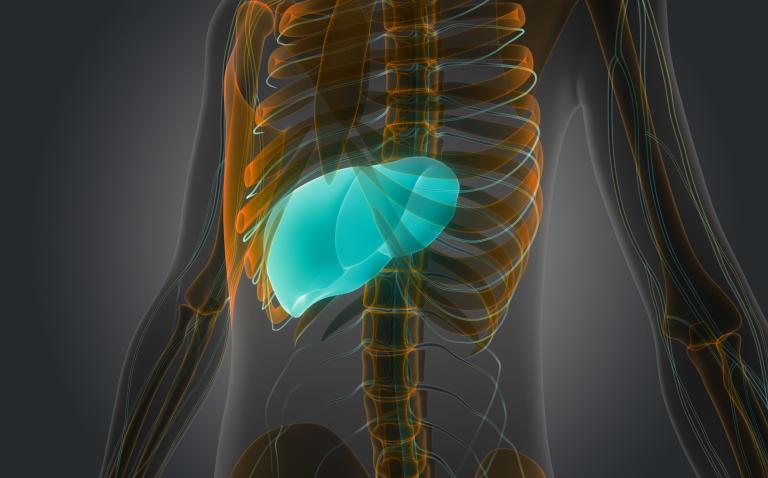Stivarga® (regorafenib) has been accepted by the Scottish Medicines Consortium (SMC) as a monotherapy for the treatment of adult patients with hepatocellular carcinoma (HCC) who have been previously treated with Nexavar® (sorafenib).1
Regorafenib is the first medicine to be specifically licensed for second-line use in patients with HCC who had formerly been treated with sorafenib, the German multinational pharmaceutical company Bayer has announced.
The medicine is taken orally and works by slowing down the growth and spread of cancer cells by cutting off the blood supply that keeps cancer cells growing.2
Judi Rhys, chief executive of the British Liver Trust said: “A diagnosis of hepatocellular carcinoma (HCC) is truly devastating – it is a horrendous type of liver cancer that is often diagnosed very late with few treatment options.
“We are delighted that the Scottish Medicines Consortium (SMC) has accepted the Trust’s evidence on behalf of patients and agreed to the use of this drug for patients in Scotland.
Evidence shows that outcomes for people with advanced liver cancer are particularly poor, so this is an important step.”
She added the decision “highlights a two tier system where patients in other parts of the UK are denied access to this new treatment that can improve outcomes”.
The positive SMC announcement follows the recent decision from the National Institute for Health and Care Excellence (NICE) to not recommend the use of regorafenib on the NHS in England.3
Amanda Cunnington, head of patient access, Bayer UK said regorafenib was “the first advancement in licensed treatment for liver cancer patients in nearly a decade”and that it offers “the first and only approved second-line systemic treatment option which could significantly improve patients’ overall survival”.
Regorafenib is licensed based on data from the international, multicentre, placebo controlled Phase III RESORCE [Regorafenib after Sorafenib in patients with hepatocellular carcinoma; NCT 01774344] trial. The trial investigated patients with HCC whose disease had progressed during treatment with sorafenib.4
In the trial, regorafenib plus best supportive care (BSC) was shown to provide a statistically significant and clinically meaningful improvement in overall survival (OS) versus placebo plus BSC (10.6 vs. 7.8 months, respectively, (HR 0.62; 95% CI 0.50-0.79; p=0.000017)) which translates to a 37% reduction in the risk of death over the trial period.4
Adverse events observed in the RESORCE trial were generally consistent with the known safety profile of regorafenib.4 The most common (>=30%) treatment-emergent adverse events were hand–foot skin reaction, diarrhoea, fatigue and hypertension.4
HCC is the most common type of primary liver cancer.5 Liver cancer is a difficult-to-treat cancer with an annual mortality rate of 48,000 in the EU.6 Globally, it is the second leading cause of cancer-related deaths.6 In the UK, there are over 5500 new cases of primary liver cancer diagnosed each year, which is around 15 patients each day.7
References
- SMC. regorafenib 40mg film-coated tablets (Stivarga®). SMC No 1316/18. Bayer plc. April 2018. Available at: http://www.scottishmedicines.org.uk/files/advice/regorafenib__Stivarga__FINAL_March_2015Revised_250315_for_website.pdf (Last accessed May 2018).
- European Medicines Consortium (EMC) Stivarga® Patient Leaflet. Available at: https://www.medicines.org.uk/emc/files/pil.1263.pdf (Last accessed April 2018).
- National Institute for Health and Care Excellence (NICE) Regorafenib for previously treated advanced hepatocellular carcinoma. Technology appraisal guidance [TA514] Published date: 21 March 2018. Available at: https://www.nice.org.uk/guidance/ta514/chapter/1-Recommendations (Last accessed April 2018).
- Stivarga® (regorafenib) Summary of product characteristics. Bayer HealthCare. September 2017. http://www.ema.europa.eu/docs/en_GB/document_library/EPAR_-_Product_Info… (Last accessed April 2018).
- Cancer Research UK. Liver Cancer Types. Available at: http://www.cancerresearchuk.org/aboutcancer/liver-cancer/types. (Last accessed April 2018).
- GLOBOCAN 2012: Estimated Cancer Incidence, Mortality and Prevalence Worldwide in 2012. http://globocan.iarc.fr/Pages/fact_sheets_cancer.aspx (Last accessed April 2018).
- Cancer Research UK. Liver Cancer Incidence Statistics. Available at http://www.cancerresearchuk.org/health-professional/cancer-statistics/statistics-by-cancer-type/livercancer/incidence#heading-Zero (Last accessed April 2018).










